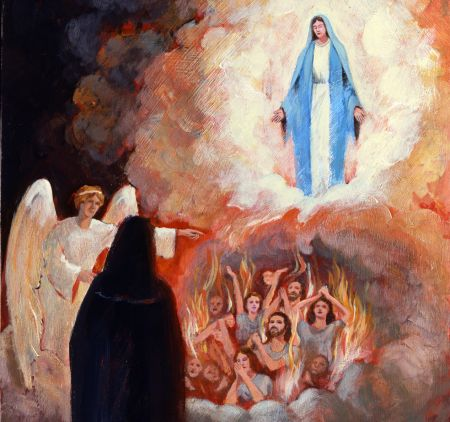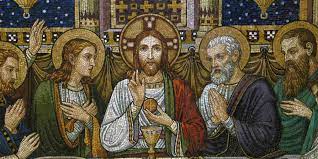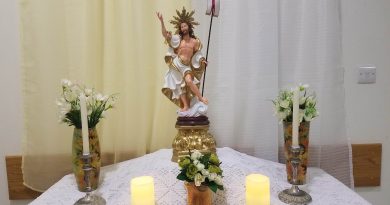Divine Mercy and the existence of Hell
“I don’t believe that there is hell. Hell is an invention of the Church to control the people”. This is the excuse some “smart” and seemingly intelligent persons tend to pose forward to justify their unbelief for the existence of hell.
However, the Word of God, the Bible, says another thing. In fact, many are the instances which clearly show the existence of hell. We shall limit ourselves to mention just a few. Then they will go away to eternal punishment, but the righteous to eternal life (Matt 25:46). And throw them into the blazing furnace, where there will be weeping and gnashing of teeth (Matt 13:50). They will be punished with everlasting destruction and shut out from the presence of the Lord and from the glory of his might (2 Thess 1:9). In a similar way, Sodom and Gomorrah and the surrounding towns gave themselves up to sexual immorality and perversion. They serve as an example of those who suffer the punishment of eternal fire (Jude 1:7). They will throw them into the blazing furnace, where there will be weeping and gnashing of teeth (Matt 13:42). But the cowardly, the unbelieving, the vile, the murderers, the sexually immoral, those who practice magic arts, the idolaters and all liars—they will be consigned to the fiery lake of burning sulfur. This is the second death (Rev 21:8). Do not be afraid of those who kill the body but cannot kill the soul. Rather, be afraid of the One who can destroy both soul and body in hell (Matt 10:28).
The Catechism of the Catholic Church is crystal clear about the existence of Hell. It says:
We cannot be united with God unless we freely choose to love him. But we cannot love God if we sin gravely against him, against our neighbor or against ourselves: “He who does not love remains in death. Anyone who hates his brother is a murderer, and you know that no murderer has eternal life abiding in him.” Our Lord warns us that we shall be separated from him if we fail to meet the serious needs of the poor and the little ones who are his brethren. To die in mortal sin without repenting and accepting God’s merciful love means remaining separated from him for ever by our own free choice. This state of definitive self-exclusion from communion with God and the blessed is called “hell” (No. 1033).
Jesus often speaks of “Gehenna” of “the unquenchable fire” reserved for those who to the end of their lives refuse to believe and be converted, where both soul and body can be lost. Jesus solemnly proclaims that he “will send his angels, and they will gather . . . all evil doers, and throw them into the furnace of fire,” and that he will pronounce the condemnation: “Depart from me, you cursed, into the eternal fire!” (No. 1034).
The teaching of the Church affirms the existence of hell and its eternity. Immediately after death the souls of those who die in a state of mortal sin descend into hell, where they suffer the punishments of hell, “eternal fire.” The chief punishment of hell is eternal separation from God, in whom alone man can possess the life and happiness for which he was created and for which he longs (No. 1035).
The affirmations of Sacred Scripture and the teachings of the Church on the subject of hell are a call to the responsibility incumbent upon man to make use of his freedom in view of his eternal destiny. They are at the same time an urgent call to conversion: “Enter by the narrow gate; for the gate is wide and the way is easy, that leads to destruction, and those who enter by it are many. For the gate is narrow and the way is hard, that leads to life, and those who find it are few” (No.1036).
Since we know neither the day nor the hour, we should follow the advice of the Lord and watch constantly so that, when the single course of our earthly life is completed, we may merit to enter with him into the marriage feast and be numbered among the blessed, and not, like the wicked and slothful servants, be ordered to depart into the eternal fire, into the outer darkness where “men will weep and gnash their teeth (No.1036).
God predestines no one to go to hell; for this, a wilful turning away from God (a mortal sin) is necessary, and persistence in it until the end. In the Eucharistic liturgy and in the daily prayers of her faithful, the Church implores the mercy of God, who does not want “any to perish, but all to come to repentance”: Father, accept this offering from your whole family. Grant us your peace in this life, save us from final damnation, and count us among those you have chosen (No.1037).
The Diary of St Faustina speaks so clearly about the realm of Hell.
Today, I was led by an Angel to the chasms of hell. It is a place of great torture; how awesomely large and extensive it is! The kinds of tortures I saw: the first torture that constitutes hell is the loss of God; the second is perpetual remorse of conscience; the third is that one’s condition will never change; the fourth is the fire that will penetrate the soul without destroying it-a terrible suffering, since it is a purely spiritual fire, lit by God’s anger; the fifth torture is continual darkness and a terrible suffocating smell, and, despite the darkness, the devils and the souls of the damned see each other and all the evil, both of others and their own; the sixth torture is the constant company of Satan; the seventh torture is horrible despair, hatred of God, vile words, curses and blasphemies. These are the tortures suffered by all the damned together, but that is not the end of the sufferings. There are special tortures destined for particular souls. These are the torments of the senses. Each soul undergoes terrible and indescribable sufferings, related to the manner in which it has sinned. There are caverns and pits of torture where one form of agony differs from another. I would have died at the very sight of these tortures if the omnipotence of God had not supported me. Let the sinner know that he will be tortured throughout all eternity, in those senses which he made use of to sin. I am writing this at the command of God, so that no soul may find an excuse by saying there is no hell, or that nobody has ever been there, and so no one can say what it is like (Diary, 740).
Then, after such a horrible description of the land of eternal suffering St Faustina made the following important declaration:
I, Sister Faustina, by the order of God, have visited the abysses of hell so that I might tell souls about it and testify to its existence. I cannot speak about it now; but I have received a command from God to leave it in writing. The devils were full of hatred for me, but they had to obey me at the command of God. What I have written is but a pale shadow of the things I saw. But I noticed one thing: that most of the souls there are those who disbelieved that there is a hell. When I came to, I could hardly recover from the fright. How terribly souls suffer there! Consequently, I pray even more fervently for the conversion of sinners. I incessantly plead God’s mercy upon them. O my Jesus, I would rather be in agony until the end of the world, amidst the greatest sufferings, than offend You by the least sin (Diary, 741).
So, pay attention dear brothers and sisters, you who say that Hell does not exist. Better humbly asking God to give you the grace to start believing that Hell existence rather than risk spending your eternity into the most unimaginable sufferings possible.
And we who believe in the existence of hell, how does its existence and reality lead us to conversion? Am I letting the reality of Hell make me more responsible to cling on to Jesus and His unfathomable Mercy and try to show it in my prayer, words and deeds on behalf of my brothers and sisters in need?
JESUS I TRUST IN YOU!
Fr Mario Attard OFM Cap





